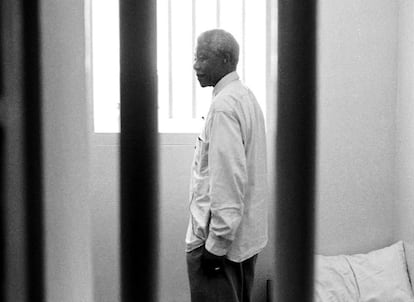Richard Feynman and Arline Greenbaum, in the image of the cartel of the film 'I Love My Wife'.
Shaun Usher had dropped out of college, didn't really know what to do with his life, and was working in a Manchester bar - "when I wasn't on duty, I was spending my pay on the other side of the bar" - when "a girl with a Scottish accent and Spanish roots ”, Karina Blanco, wanted to teach him how to“ make cocktails ”. They had only seen each other for two weeks when she had to move to Spain for a course in Salamanca. They did not want to lose contact and began to write to continue knowing each other. "During those 10 months that we lived hundreds of kilometers apart, I not only fell in love with the one who was going to be my wife [they have just been married for nine years], but with the written letters." In 2009, Usher created a blog,
Letters of note,
to spread some of the most beautiful, tender, romantic or fun missives in history.
Passion became an industry: his website has had 126 million visits, and the 15 books he has published in the Memorable Letters collection have been translated into about twenty languages.
When others would have thrown in the towel — it was only two weeks after all — they decided to move on;
And as the rest of the world opened WhatsApp accounts and sent dozens of daily emails over the phone, Usher discovered the fascinating, universal, and seemingly imperishable power of a paper and a stamp.
"The simple act of picking up a pen in front of a blank sheet activates a part of the brain that you don't use when you send an email
almost without realizing it.
Regardless of the time or the language, writing a true love letter is taking risks.
You are not only opening yourself up, making yourself vulnerable, but you are doing it in writing, in a document that may one day appear in a book read by thousands of strangers ”.
Amor
(Salamandra) gathers 31 missives written by couples and lovers;
by famous and anonymous characters;
separated by wars, prison sentences, concentration camps, illness or simple travel.
A Nobel Prize Winner for Literature, John Steinbeck, responds to a letter from his 14-year-old son Thom, who asks for advice about a recent event in his life, something common that just happened to him for the first time.
“First of all, congratulations.
Falling in love is the best thing that can happen to a person, don't let anyone downplay or frivolize about it.
Sometimes it happens that your feelings are not reciprocated for whatever reason;
that does not mean that they are less valuable or noble.
And don't worry if things go wrong.
If it has to be, it will be.
The most important thing is not to rush: good things do not escape just like that ”.
Nelson Mandela returns to the Robben Island cell on the fourth anniversary of his release, February 11, 1994. Patrick de Noirmont / REUTERS
Nelson Mandela writes to his wife, Winnie, from the 2.4 by 2.1 meter cell in which he spent 18 of his 27 years in prison, after learning that she, also an anti-
apartheid
activist
,
she has been sentenced to 17 months in jail. It is June 23, 1969 and the one who would be the first black president of South Africa sends you these lines of encouragement: “The conquest of a new world will not come from the hand of those who keep their distance and remain idle, but from those whose garments end up torn by the storm. (…) Since the dawn of history, humanity has honored and respected brave and honest people, men and women like you, my love. My loyalty to you prevents me from saying more than I have already said in this letter that has to pass through many hands. One day we will enjoy an intimacy that will allow us to share the thoughts that we have kept in the depths of our hearts throughout these eight years ”. They had only been married for five when he was incarcerated.Their marriage lasted almost four decades.
In March 1796, 48 hours after marrying Josephine de Beauharnais, Napoleon Bonaparte "has to separate from his wife to command the Gallic army," Usher recalls. "He was an inveterate handwriter and managed to write countless love letters to his wife, even from the front lines." But Josefina did not respond as quickly, and in July of that year Bonaparte tenderly rebuked her: “I have called the messenger. He says he stopped by your house and you told him you didn't have any messages for me. Shame on you, dear mischievous, indolent, cruel and tyrannical little monster. You mock my weakness for you. Tell me that you are happy, in good health and full of affection for me ”.
Usher's favorite card is that of another Nobel laureate, in this case from Physics.
Richard Feynman, one of the fathers of the atomic bomb, wrote in 1946 to his wife, Arline Greenbaum, who had died 16 months earlier: “Now you can't give me anything and yet I love you so much that it prevents me from loving anyone else.
Still, I want you to remain where you are: even dead, you are much better than anyone else alive. "
Feynman survived his wife 43 years.
Their daughter, Michelle, found the letter among her belongings: "It was very worn, much more than the others, as if my father had read it often."
Usher has seen "thousands" of letters but none affected him like this.
"Love never dies," he explains.
Discover the best stories of the summer in
V Magazine
.





/cloudfront-eu-central-1.images.arcpublishing.com/prisa/YNQTDG2JGZEMVFHMYQM3UJ7FU4.jpg)






/cloudfront-eu-central-1.images.arcpublishing.com/prisa/KMEYMJKESBAZBE4MRBAM4TGHIQ.jpg)


